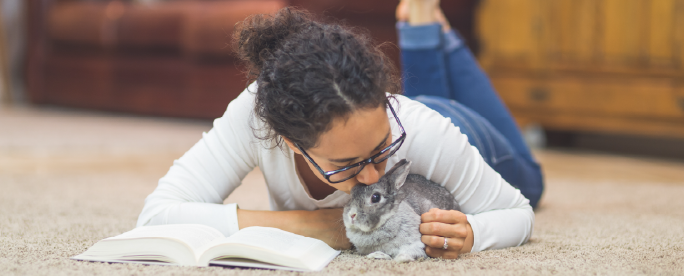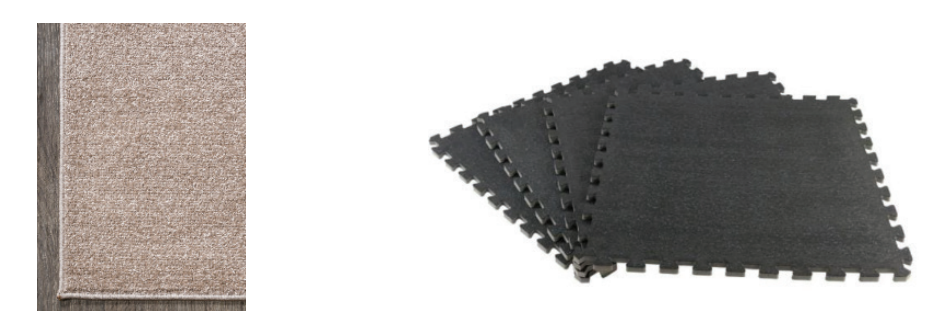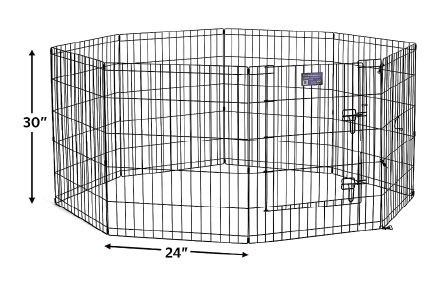Habitat

Housing
Your rabbit will need specific items to live safely in your home. Indoor rabbits prefer to have their personal space, just like humans. They do not need a large area. Free roaming is still necessary for a rabbit to get exercise and stay fit. They do need a space to call their home.
Oxbow has a great guide to learn how to free roam your bunny.
Floor coverings are important. A rabbit needs traction to hop. It is essential to have rugs around your home and in the pen if you have tile or wood flooring. Rabbits can develop splayed legs if they cannot get a grip with their paws. Types of appropriate flooring include:

- garage flooring tiles
- low-pile carpet
- nonslip pieces of linoleum
- rubber flooring
Enclosures:
- Rabbits enclosed should be AT LEAST 4-6 times the size of your rabbit while stretched out.
- Here are some enclosure ideas for your bunny:
 Home is where your bunny is! This enclosure is a great example of using an x-pen. It is a
smaller sized enclosure that uses up the space very nicely with all the necessities a bunny
needs.
Home is where your bunny is! This enclosure is a great example of using an x-pen. It is a
smaller sized enclosure that uses up the space very nicely with all the necessities a bunny
needs.
 An x-pen enclosure with hutch! Hutches should stay open at all times. We do not allow cages
such as hutches (unless encircled by an exercise pen).
An x-pen enclosure with hutch! Hutches should stay open at all times. We do not allow cages
such as hutches (unless encircled by an exercise pen).
 A great way to allow a safe space for your bun while also allowing them to be free-roam.
This keeps all their necessities in one area, and allows you the flexibility to enclose them
in when you need to.
A great way to allow a safe space for your bun while also allowing them to be free-roam.
This keeps all their necessities in one area, and allows you the flexibility to enclose them
in when you need to.
 Two x-pens are better than one! Joining two x-pens together is a great way to create a
bigger space for your bun.
Two x-pens are better than one! Joining two x-pens together is a great way to create a
bigger space for your bun.
 Custom made enclosures can be a creative and aesthetically pleasing way to give your bunny
a nice space to live. While these types of enclosures look really nice, you still need a
portable x-pen for emergencies.
Custom made enclosures can be a creative and aesthetically pleasing way to give your bunny
a nice space to live. While these types of enclosures look really nice, you still need a
portable x-pen for emergencies.
 An enclosure made out of 2 x-pens for more space. Nice soft flooring and plenty of room to
stretch out.
An enclosure made out of 2 x-pens for more space. Nice soft flooring and plenty of room to
stretch out.
 Free roaming your bunny is a great option once your bun is litter trained. Just be sure to
bunny proof the spaces they are allowed in. While free roaming gives your bunny tons of
space, you still need a portable x-pen for emergencies. Watch our Bunnies Do What?!? Like Spicy Hay video!
Free roaming your bunny is a great option once your bun is litter trained. Just be sure to
bunny proof the spaces they are allowed in. While free roaming gives your bunny tons of
space, you still need a portable x-pen for emergencies. Watch our Bunnies Do What?!? Like Spicy Hay video!
X-pen Living:

We require all of our rabbits to have an exercise pen (x-pen) or configurable panel pen. We do not allow cages, hutches (unless encircled by an exercise) pen or NIC grids. These pens are ideal for your bunny's home within your home. Even if you bunny will free roam all of the time, an exercise pen is needed for emergencies. After all, we live in Florida and experience hurricanes.
X-pens or configurable pet panels are great alternatives to cages and hutches as they come in a variety of heights, are expandable, and are configurable as rectangles, squares and can offer unique layouts. They provide ample space for your bunny and are easy to clean and portable.
Videos of Bunny Life:
Our 2021 Virtual Bunny Cafe highlighted some great habitat ideas for bunnies and why bunnies need so much space to play!
Require lots of room
Field & Track experts
The Scary Outdoors
Often we are asked why we do not permit our rabbits to be kept outdoors. House rabbits are precisely that—house rabbits. They are not wild and are not bred to be outdoor pets. House rabbits are susceptible to botflies, fleas, ticks, fly-strike, scabies, ear mites, and many other issues.
Can I Walk My Rabbit on a Leash - Mary Cotter and Amy Sedaris (rabbit.org)
We advocate indoor bunnies ONLY! We do not support housing a bunny outdoors even in a hutch, run or a screened-in back porch. Read Hazards to Outdoor Buns. We cannot emphasize enough the importance of keeping a house rabbit indoors. They cannot withstand the Florida heat. They cannot protect themselves from predators, and we have many. Wild animals in Florida are in every neighborhood and backyard. Keep your rabbit safe—INDOORS.

Outdoors rabbits are exposed to predators, parasites, viruses and extreme temperatures that are typical of outdoor living. Rabbits are very social creatures, and keeping them outdoors will cause depression and loneliness. Keeping your rabbit indoors not only keeps them clean and safe, but it also allows them to form a bond and become part of the family.